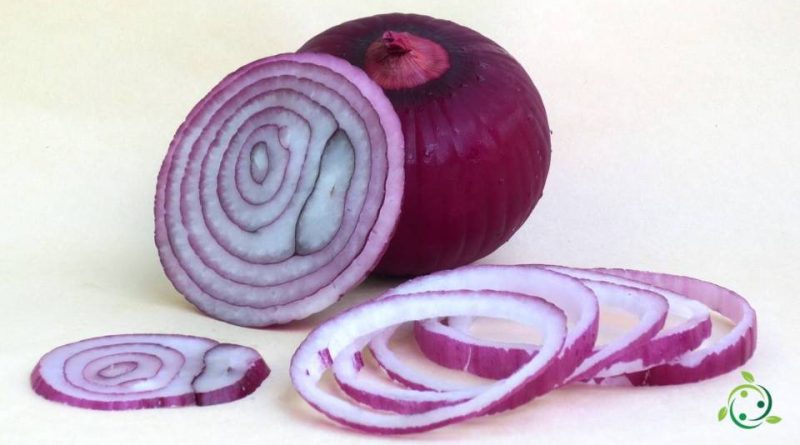Nutritional value of the onion
Nutritional value of the onion
Onion (Allium cepa L.) is a bulbous plant of the Amaryllidaceae family.
The bulb grows underground and is formed by modified leaves, which have an epidermis (protection). It is a biennial herbaceous plant whose life cycle, in cultivation, is interrupted at one year in order to be used for consumption.
It is a plant with superficial roots, with leaves which, as mentioned, swell in the basal portion giving the edible part and which forms a long flower stem that bears an umbrella inflorescence with yellowish-white flowers. The fruit is a capsule.
Features –
The edible part of the onion is the bulb which is strongly aromatic; this vegetable is botanically related to other vegetables with similar characteristics, such as garlic, leek, shallot and chives.
The onion is extremely widespread, almost all over the world, and many varieties are grown; in Italy the most famous are: Tropea (red), Cannara (red), Bassano (red), Dolce (white), Barletta (red) and Borretana (golden yellow).
Its main use is as a food and condiment, but it is also used for therapeutic purposes due to the properties recognized by the science and traditions of popular medicine.
Its particular taste gives flavor to the preparations and enhances the other ingredients used in the various dishes of national and international cuisine, in fact it serves as an ingredient for the preparation of many dishes. It is used as a base for soups, minestrone and risottos, meats, sauces, to flavor salads, or for the realization of different dishes that where it becomes the central condiment.
Nutritional factsheet –
Onion is a product of vegetable origin that can be classified in the group of vegetables that contains a lot of water and has a fair amount of fructose, sugar which, in addition to giving it a certain sweetness, gives it a mild energetic function. Proteins and lipids are irrelevant; cholesterol is absent.
With regard to mineral salts and vitamins, there are no concentrations worthy of particular note, so it is possible to say that onion contains “a little bit of everything”.
It does not contain gluten and lactose, and is accepted by vegetarian and vegan philosophies.
The average portion of onion can reach up to 200 g (80 kcal).
The nutritional values per 100 g of onion are:
– Energy 40 kcal;
– Total carbohydrates 9.34 g;
– Simple sugars 4.24 g;
– 1.7 g fibers;
– Fat 0.1 g;
– Protein 1.1 g;
– Water 89.11 g;
– Thiamine (B1) 0.046 mg – 4%;
– Riboflavin (B2) 0.027 mg – 2%;
– Niacin (PP or B3) 0.116 mg – 1%;
– Pantothenic acid (B5) 0.123 mg – 2%;
– Pyridoxine (B6) 0.12 mg – 9%;
– Folate 19.0 μg – 5%;
– Ascorbic acid (C) 7.4 mg – 9%;
– Calcium 23.0 mg – 2%;
– Iron 0.21 mg – 2%;
– Magnesium 10.0 mg – 3%;
– Manganese 0.129 mg – 6%;
– Phosphorus 29.0 mg – 4%;
– Potassium 146.0 mg – 3%;
– Zinc 0.17 mg – 2%;
– Fluoride 1.1 μg -%.
Property –
Due to its organoleptic characteristics and the substances it contains, the onion boasts some remarkable antioxidant and anti-inflammatory properties; it also contains good amounts of quercetin, a flavonoid that helps keep cholesterol and triglyceride levels in the blood at bay, parameters which, if normal, we know are very important in protecting the body from cardiovascular risk. In addition to fats, onion is also able to have a positive effect on blood sugar, thus reducing blood sugar levels.
One of the most interesting benefits of the onion is its antibacterial and antimicrobial capacity, therefore it is a bulb capable of preventing the proliferation of microorganisms that are potentially harmful to health. At the same time it is able to stimulate the immune system.
Onion is also an excellent detoxifying remedy with a diuretic action. That is, it is due to the great wealth of water that makes it an interesting natural remedy even for those who have to fight the problem of water retention, obviously associated with a correct overall diet and the right amount of physical activity.
In general, the onion is an excellent expectorant remedy, therefore useful in case of cough and cold. It decongests the mucous membranes and can be used when there is a lot of phlegm, bronchitis, sinusitis, etc.
A study conducted in collaboration between the University of Milan and the Mario Negri Pharmacological Institute then noted that those who consume onion more often (at least twice a week) as well as garlic are less at risk of getting cancer at the same time. stomach.
Among the other properties of the onion we include the ability to strengthen bones by protecting them from the risk of osteoporosis and the fact that it improves mood thanks to the beneficial action of its active ingredients that help regulate hormones such as serotonin.

